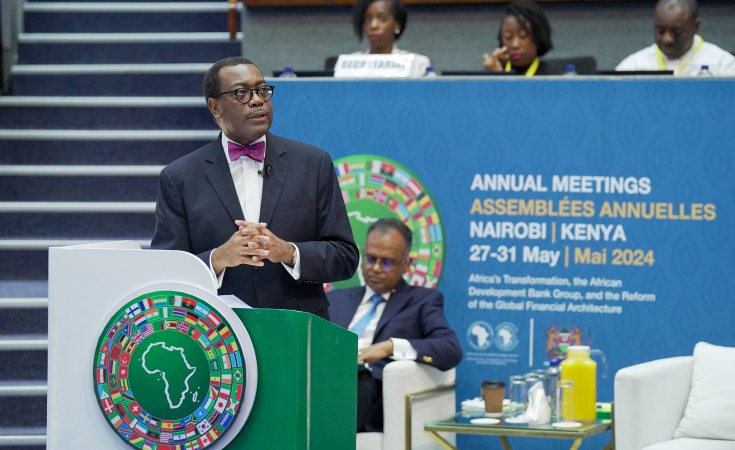African Development Bank President Dr Akinwumi Adesina says the world is changing and Africa needs to be at the table.
Adesina told more than 150 journalists covering the Bank's Annual Meetings in Nairobi that the Global South is becoming much more important and that as a result the global financial architecture needs to change:
"The global financial architecture is not addressing Africa's issues nor delivering for Africa. Our voice needs to be at the table. The global financial architecture needs to be creating fairness, equality, justice, representation and inclusiveness."
Adesina welcomed the International Monetary Fund's decision to create a third seat for Africa on its Board, and the inclusion of South Africa and the African Union in the G20, adding that he thought there should be a second seat for Nigeria in the G20. He stressed, however, that collaboration was key:
"Africa is coming of age on the strength of south-south cooperation, but I don't see the world in a divisive manner. We should be looking at our ability to pool our energies and harness all our diversity for the good of the world. All our development banks cooperate and now there isn't a single project in Africa that we can't finance - not one".
He said that he believed strongly in Africa's future:
"I'm an African. We have the potential to be great as a continent...We have 477 million people under the age of 25. Africa will be the workshop of the world and is full of entrepreneurs and young people able to take opportunities".
He said that Africa's agricultural potential, with 65% of the world's uncultivated arable land, will determine the future of the world's food supply and will make the continent globally competitive. The Bank is investing heavily in agriculture and cited the Bank's work in Ethiopia where it has given heat tolerant wheat varieties to local farmers. 5,000 hectares were planted, that has now grown to 2 million hectares and as a result Ethiopia is now self-sufficient in wheat production and starting to export.
"If we can do that for Ethiopia", says Dr Adesina, "we can do it anywhere".
Combatting climate change is a key theme at the Annual Meetings as Africa experiences extreme weather patterns bringing devastating floods in Kenya and Mozambique and droughts in Tanzania, Malawi and Zimbabwe which declared a national emergency as the drought grew in intensity and scale.
Adesina said he was humbled that the Bank was meeting against this backdrop of floods that recently devastated parts of Kenya and conveyed his sympathy to the families of people who lost their lives.
Adesina says that Africa will drive the global agenda for renewable energy, employing solar power to fuel future energy needs. By 2030 the African Development Bank in collaboration with the World Bank will connect 300 million Africans to electricity. Already the Bank's New Deal for Africa has increased access to power from 37% of Africans to 52%, while it's $20 billion Desert to Power project in the Sahel will generate 10,000 Megawatts of power, bringing electricity to 250 million people.
"Electricity is the life blood of economic development" says Dr Adesina, "it enables digital infrastructure, rail and transport corridors like the Lobito Corridor between Angola, Zambia and the DRC, and the Lagos to Abidjan highway".
Adesina said infrastructure like this supported the Banks High 5" objectives to integrate Africa and industrialise Africa. He said he was proud that the two strategic objectives along with the other three High 5s - to "power Africa, feed Africa and improve the quality of life for the people of Africa "- had transformed the lives of 400 million Africans since he introduced them in 2016:
"If we will keep doing these High 5s Africa will achieve 90% of its UN Sustainable Development Goals (SDGs)and 90% of AU's Agenda 63 goals. I'll work to the last second to achieve this".
The 5-day African Development Bank's Annual Meetings will be end from 27-31st May in Nairobi, Kenya.



